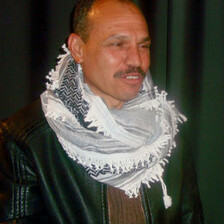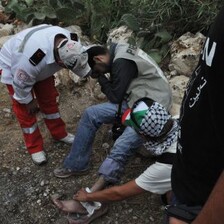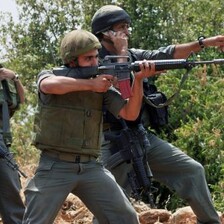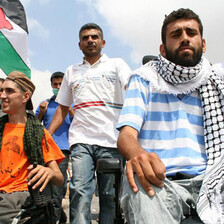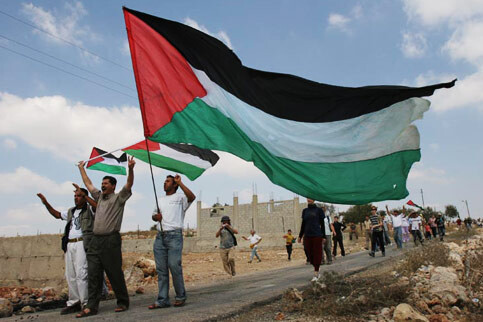
Palestinians take part in one of the nonviolent demonstrations against Israel’s wall in Bilin, September 2006. (Oren Ziv/ActiveStills)
The following is Palestinian nonviolent resistance activist Ahmed A. Khatib’s story as told to The Electronic Intifada contributor Jody McIntyre:
My name is Ahmed A. Khatib, I am 32 years old, and married with four children. I live in the village of Bilin, where I work on our family’s farm.
When Israel started building the wall here in 2005, I was working with the al-Aqsa Martyrs Brigades military, the armed wing of the Fatah party. But at first, the villagers went to our land not to “resist,” but simply to see what the Israeli soldiers were doing. There was no planning, no such things as “demonstrations,” and no organization. We were just curious as to why these strangers were stealing our olive groves. So, in effect, our popular struggle was initiated through ordinary people walking to their land.
However, as the Israelis’ intentions became evident, the people of the village agreed that the formation of a local popular committee would be the best way forward.
After a couple of initial meetings, it was decided that we would embark on a campaign of nonviolent resistance, drawing inspiration from the struggle in Budrus village, where they had actually succeeded in moving the route of the wall. At first, I thought the suggestion was a joke — I had friends who had been killed, friends locked up in prison. I worked with guns to fight against the occupation, so it was difficult for me to believe that we could ever return to our land through nonviolent means.
But we are farmers from a small village, simple people, fighting against the fourth largest military in the world. If you think about it, Bilin is home to around 1,500 inhabitants; half of those are women, plus a few hundred children, and maybe 50 elderly men. You aren’t left with many people to take up an armed struggle against the Israeli army.
At the first demonstration, the army really didn’t have a clue how to deal with us! Because we came to them as unarmed citizens, they were left with no pretext to shoot at us. Instead, they started beating us with their weapons. Before, I didn’t believe that Israeli and international activists would be able to help, but then I saw them becoming human shields, taking the soldiers’ blows for us Palestinians. When we returned to the village, everyone had an injury to show. It was a great feeling to see that kind of solidarity, although I still remained skeptical about the concept of nonviolent resistance.
However, we started to see the name of our village and our photos all over the media, and people from around the world were saying that these simple farmers really could challenge this brutal army.
Demonstration after demonstration, I started to believe in the nonviolent struggle. However, this put a strain on my relationships with my al-Aqsa friends, whom I tried to convince of the benefits of these new methods. Some were willing to listen; this was at a time when Abu Mazen (Mahmoud Abbas, the Palestinian Authority president) had won the presidential election and made a temporary truce with Israel, so people were looking for a new way forward.
When our struggle first started in Bilin, the al-Aqsa military declared that they would come to the village and kill the army. But I went to them and told them not to interfere — this was our decision, our struggle, and we went to our demonstrations with women and children — and they listened to me.
After a few demonstrations had passed, the Israeli occupation forces arrested someone from the al-Aqsa military, and they told the Shabak (Israel’s internal security service, also known as the Shin Bet) that I had helped with transporting weapons. The army raided the village on 29 October 2006, four days after Hamas had taken an Israeli soldier hostage in Gaza.
That day, an Israeli taxi driver had been kidnapped and gone missing, so when I saw soldiers outside my home, I presumed it was an arbitrary search for him. I didn’t for one second think they had come to arrest me, because I had stopped working with al-Aqsa some time before. Once they were sitting in my front room, I even offered them some tea, but they said they didn’t drink on the job.
They let me smoke a cigarette, and said that they were searching many houses, so I relaxed. But after ten minutes, the soldiers told me to be ready, because the Shabak were coming to arrest me.
I stayed in jail for 13 months, but the experience didn’t change anything in me. I had changed my ideas well before I was arrested.
I spent the first month in Ramle prison, where I was joined by 20 Hamas politicians, whom I later found out had been arrested on the same night as me. So every day, although we stayed in different rooms, I came face-to-face with them. When they heard I was from Bilin, they asked me about our struggle — I knew that Hamas had refused to join our struggle at first, so I started to explain how we practiced nonviolent resistance, and how the Israelis and internationals were helping and could use their experience in Bilin to pressure their own governments into taking action against the occupation. By the time I had finished, they promised that once they were released, they would join us in Bilin.
For me, it was a great personal victory to see that I could convince these important leaders, so I started to talk to all my friends in jail about the nonviolent struggle. Every Saturday they brought the newspapers to the prison, and it was always understood that Ahmed Khatib could read the first copy, so that I could see the report from the Friday demonstration in my village. I also saw Bilin live on Al-Jazeera; I couldn’t believe I was seeing my friends on the prison’s television! All this strengthened my beliefs; sometimes I asked myself, there are 2,000 Palestinian prisoners here — maybe the nonviolent struggle could release us one day?
They had sentenced me to 28 months in prison, but it was my fate to be released after 13, along with 250 other Palestinians, when Abbas and Israeli Prime Minister Ehud Olmert made their prisoner release deal.
A short time after I was released, the Israeli high court gave an order to change the route of the wall in Bilin. When I heard the news, I was filled with a happiness that I had only felt twice before — when my first child was born, and when I heard my name being read out on the list of those to be released on a secret radio while still in jail. I was so overjoyed that I ran to the local mosque and announced the victory on the loudspeaker! We got music and started dancing on the streets, calling all our friends to let them know what had happened.
Without a moment of planning, we took an impromptu demonstration to the wall, and started throwing sweets at the Israeli army. The soldiers were looking pretty nervous.
I felt like I was on top of the world — we had won, and this was a victory not only for us, but for every person who had visited Bilin. I truly believed that our experience would inspire other villages, and that we would become a symbol — a spark for a world struggle for freedom.
But slowly, I began to wake up from the dream. Two years later, our situation hasn’t changed. For me, I will never return to armed resistance, now that I have a family to look after. But I see the entire village as my family, and I really want to see something good for them — for the wall to be destroyed, and for the people of Bilin to return to our lands. I am still waiting for that moment.
Unfortunately, the tactics of Israel seem to promote armed resistance. They refuse to release just one of the 11,000 Palestinian prisoners currently rotting away in Israeli jails, but when an Israeli soldier is taken hostage, they are willing to negotiate. How can I convince the mothers of those martyred and those imprisoned that nonviolent resistance is the way forward?
But in my heart, I know that nonviolent resistance is the path to freedom for our nation. From my small village of Bilin, I hope our actions can set an example for others to follow.
Jody McIntyre is a journalist from the United Kingdom, currently living in the occupied West Bank village of Bilin. Jody has cerebral palsy, and travels in a wheelchair. He writes a blog for Ctrl.Alt.Shift, entitled “Life on Wheels,” which can be found at www.ctrlaltshift.co.uk. He can be reached at jody.mcintyre AT gmail DOT com.
